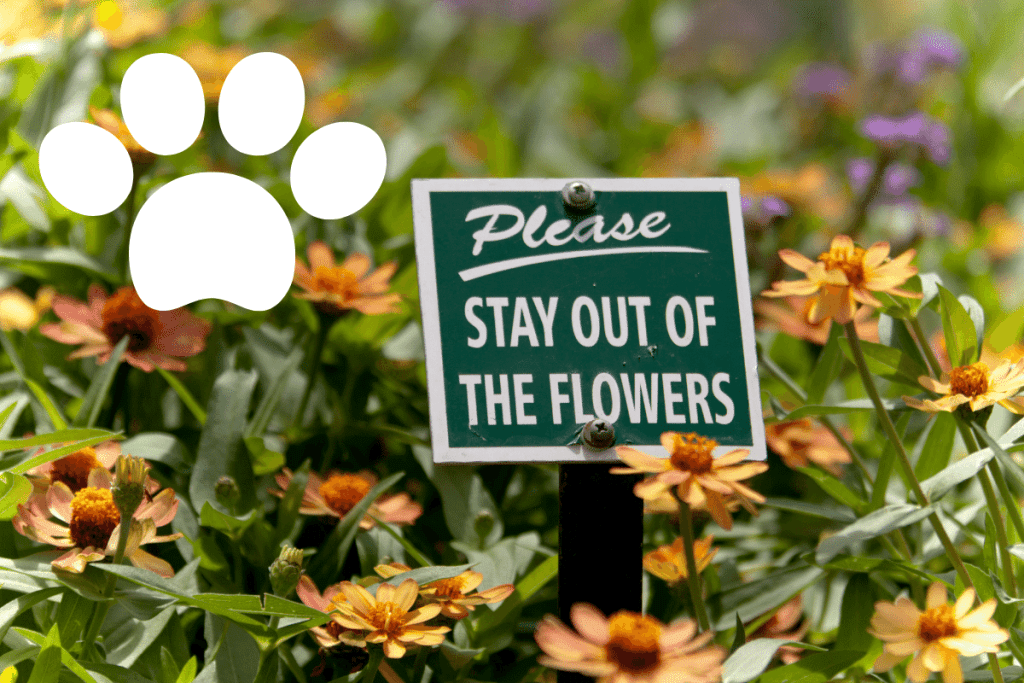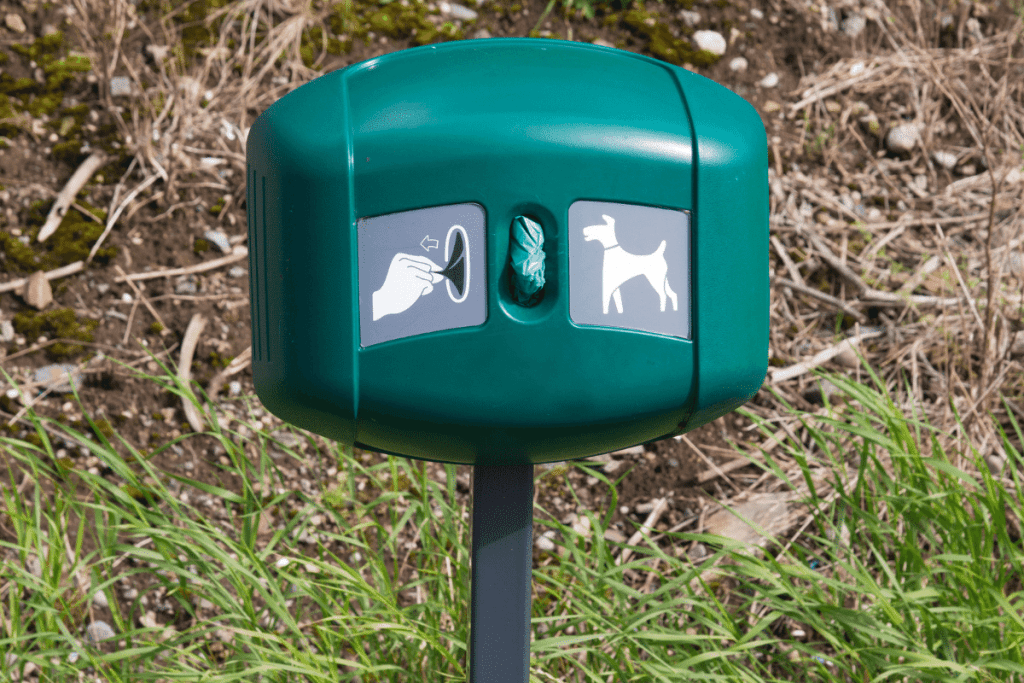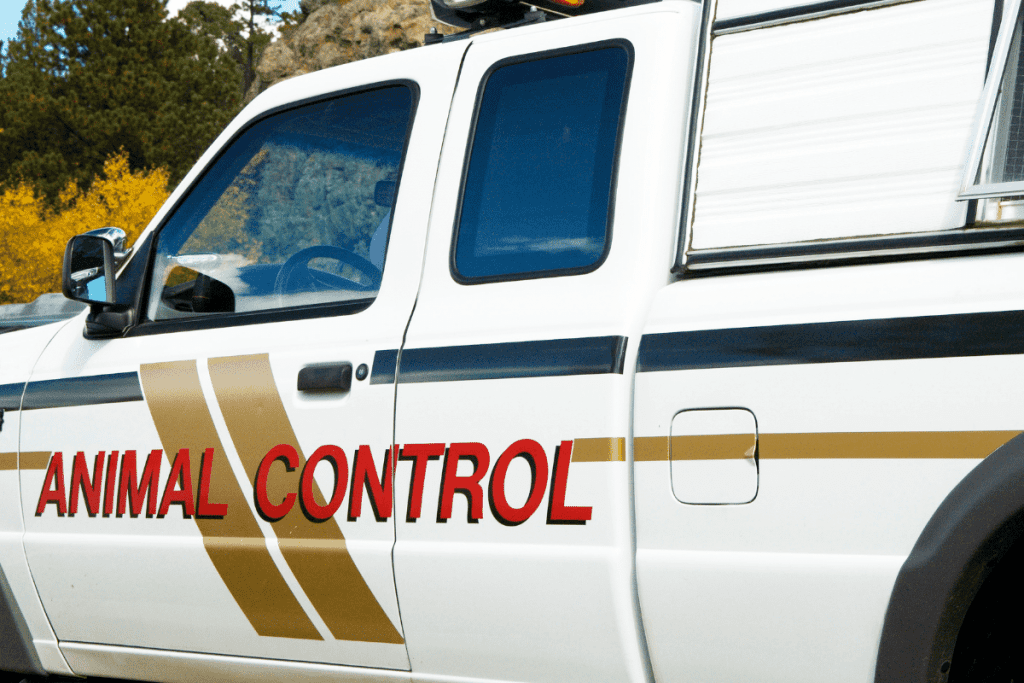If your neighbor’s dog is constantly straying into your yard, it is probably causing issues for you.
The dog may be pooping in your yard or destroying your plants.
There are also several safety concerns with other dogs in your yard.
Aside from the dog itself being aggressive or otherwise dangerous, dog poop transmits diseases such as salmonella, giardia, or tapeworms.
The dog poop is also likely to pollute water sources and kill your grass.
Other dogs coming into your yard may also cause stress to your pets.

Table of Contents
Place Warning Signs in Your Yard
An easy and effective method to prevent the neighbor’s dog from coming into your yard is to place visible warning signs on your lawn.
Signs such as “No Trespassing” or “Clean Up After Your Dog” will send a message to your neighbor about how you feel about their dog’s imposition.
When your neighbor sees these signs, they are more likely to be mindful about picking up after their dog or keeping it off your lawn altogether.
With visible signs in your yard, your neighbor has no excuse for not knowing the area is off-limits to their dog.
This is also a very polite method of expressing your dislike for having the neighbor’s dog in your yard.
Calmly Negotiate with Your Neighbors
If signs are not enough to discourage your neighbor from allowing their dog in your yard, it is time to have a calm conversation with them.
Tell your neighbor what their dog is doing in your yard, and ask them to stop letting their dogs onto your lawn.
Most dog owners will be embarrassed to learn of their dog’s bad behavior, and they will remedy the problem.
It is crucial to choose the right time to talk with your neighbor to keep the conversation friendly.
Since your neighbor is likely to be exhausted after a long day at work, it is best to wait until the weekend when they are more relaxed and have time to talk with you.
They may be allowing their dog to poop in your yard out of convenience, so offer some solutions to the problem, such as providing dog waste bags or telling them about nearby dog waste receptacles.
Stay calm and avoid raising your voice or escalating the situation into unfriendly territory.
Your neighbor will be more likely to comply with your needs if you do not appear threatening by shouting at them.
Install Security Cameras
If your neighbors refuse to believe their dog is defecating on your lawn or harming your plants, you will have to collect proof to fight back.
Installing security cameras around your lawn will catch their dog in the act and allow you to keep a close watch on your property when you are not home.
While you may consider installing hidden cameras throughout your property, it is better to place the cameras in plain sight of your neighbors.
If they know they will be caught on camera, they are less likely to allow their dog to do its business without cleaning up after it.
Visible cameras will also discourage your neighbors from walking their dogs on your property or allowing them to roam there.
Consider placing signs in your yard to let everyone know there is constant surveillance.
Establish a Neighborhood Watch
Another method of keeping the neighbor’s dog out of your yard is to form a neighborhood watch.
This is much easier than it may seem, and it is an excellent way to get to know your neighbors.
You will start by calling the authorities in your area to ask them about local ordinances regarding unwanted pets in your yard.
Once you know the correct ordinances, you will organize regular meetings with your neighbors.
During these meetings, discuss the proper etiquette for dog owners and how any issues will be resolved.
It is also important to establish rules to help guide new neighbors and how to settle neighbor disputes.
Post flyers and send notices with these rules to ensure everyone can see them.
This method will reduce dog trespassing and address issues such as excessive barking and other dog-related nuisances happening throughout the neighborhood.
Offer Doggy Bags for Waste Removal

To encourage your neighbor to pick up their dog’s feces from your yard, it is a good idea to provide doggy bags for them to use.
There may be an instance where your neighbor simply runs out of bags or accidentally leaves them at home.
Providing bags for them helps alleviate these issues and prevents your neighbor from allowing their dog to defecate in your yard without cleaning it up.
As previously stated, dog feces carry several transmittable bacteria and diseases and may also cause damage to your grass.
Posting a sign along with the doggy waste bags asking your neighbors to clean up after their dogs is also helpful to send a message to those who repeatedly do not remove their pet’s waste from your yard.
Place the doggy bags near the road or in another visible area to encourage your neighbor to use them.
Use Dog Deterrents
Since dogs have a keen sense of smell, it is helpful to place several smelly deterrents throughout your entire lawn to keep the dogs away.
There are several commercial granules or sprays specifically for this purpose or use everyday household items.
Some of these bad-smelling deterrents will need to be reapplied regularly and every time it rains.
No matter which type of deterrent you use, it is vital to be aware of any unintended effects which may cause harm to the dog.
Ammonia
Ammonia’s potent smell will prevent dogs from wanting to enter your yard.
Avoid using ammonia near waterways and fish ponds, as it will disrupt the environment in the fish’s habitat.
It may also cause damage to your grass or flower bed if too much is used.
Vinegar
Vinegar is a common pantry staple, and dogs do not care for this smell, either.
Spray the vinegar on your fences and sidewalks, but avoid using it directly on your lawn or garden.
If too much vinegar is applied, it will kill your grass and other plants.
Citrus
Citrus is another smell that will repel dogs and other animals from your yard.
Lemon or orange peels may be placed around the perimeter of your lawn as a deterrent.
The main downside of using citrus peels is that they attract mice and rats.
The citrus peels are also not very nice to look at in your yard, so you may want to only use them in your backyard.
Almond Oil or Olive Oil
Almond oil and olive oil have an unpleasant smell to dogs, and it is effective at keeping them away.
Simply spray the oil around areas where you do not want the dogs to go.
As a bonus, almond oil will also help to repel fleas in your yard.
Mousetraps
Small mousetraps will not hurt medium or large dogs, and instead, they work by scaring the animals.
Never use large rat traps because they can break bones and cause other injuries to dogs.
If you decide to use mouse traps, you need to be aware of any smaller dogs or children in the neighborhood, as the traps may injure them.
Human Urine
Some people have suggested using human urine to repel dogs, but this method is not widely recommended.
Urinating in public will get you an indecent exposure charge, and you do not want to be handling human urine in the first place.
Install a Fence
If you do not already have a fence around your yard, consider installing one.
Adequate fencing is a surefire method of preventing the neighbor’s dog from coming into your yard whenever it wants.
If your fence is damaged or there are holes underneath it, you will need to repair these areas and fill in the holes for complete security.
If the dog can jump over the fence, you will need to add some height or have a new one installed.
To keep neighbors from walking their dogs on your lawn or garden, add locks to the fence to keep them from accessing your property.
Partially bury the fence to prevent your neighbor’s dog from being able to dig underneath it as well.
Be sure to check your neighborhood’s zoning laws or HOA rules to ensure you follow the fence installation and appearance regulations.
It is also advisable to check your property lines before installing the fence to ensure you are not infringing on your neighbor’s property.
If installing a fence is not within your budget, create a barrier around your yard with rough landscaping rocks, mulch, or anything else a dog will not want to walk on.
This barrier will encourage the dog to go somewhere else before it considers coming over into your yard.
Contact Local Animal Control

If any efforts you have made to prevent dogs from coming into your yard are not working, and your neighbor is unwilling to negotiate with you, contact your local animal control authorities.
Reach out to your local animal control agency through an email or a phone call.
You will need to provide the animal control authorities with details such as where you live, how often your neighbor’s dogs are in your yard, and whether or not other neighbors are having the same issues.
It may take multiple complaints, but eventually, the animal control authorities will begin to watch your neighborhood more closely.
It is also crucial to inquire about local leash laws to better understand any legal rights you may be entitled to.
Some animal control authorities will send someone out to pick the dog up whenever it is on your property.
If the dog is a stray, they may even provide you with a humane cage to help capture the animal so it may be brought to the local animal shelter.
Contacting animal control is considered a last resort if you wish to remain on good terms with your neighbor.
Seek Legal Advice
If your neighbor’s dog repeatedly comes into your yard without permission or causes extensive damage to your lawn or garden, you may be entitled to seek legal advice.
When the damage to your yard requires costly repairs, the dog owner will be responsible for paying for them.
Much like calling animal control, taking legal action against your neighbors is considered a last resort measure.
However, if your neighbor is being uncooperative about solving the issue of their dog being on your lawn, legal action may be necessary.
Be sure to provide photos or security camera footage of the damage when you seek legal advice.
This evidence will help your attorney advise you on whether you have enough of a case to take your neighbor to court.
Remove Dog Attractants from Your Yard
Since dogs have a very sensitive sense of smell, they will be attracted to any leftover food, garbage, or animal food in your yard.
If you have pets you feed outside, consider feeding them indoors or removing their food dishes after eating.
Be sure to keep a tight lid on your garbage can so dogs and other animals cannot access what is inside.
Bone meal or blood meal, often used to repel other animals, should not be used because they will attract dogs.
If you have a female dog, it is important to have her spayed.
Spaying your dog prevents male dogs from coming into your yard to mate with her.
It is also crucial to clean up your own dog’s poop right away to avoid attracting other dogs who may be curious enough to investigate.
Clean Up Dog Feces
Dogs are very good at using their sense of smell to know where they have been before.
Removing your neighbor’s dog’s feces and then diluting the smell will make it more difficult for the dog to track.
Use water or a dog repellent to remove the smell after removing the poop to keep the dog from coming back.
Baking soda also works well to eliminate the smell of dog poop on your lawn.
Depending on your local ordinances, there may be legal ramifications of your neighbor’s dog pooping in your yard.
Find these local ordinances by performing a search online.
If you are unable to find what you are looking for, call your local county or city clerk’s office for more information.
According to laws in your area, your neighbor may have to pay a fine if their dog continues to defecate on your lawn.
Check out these ways for removing dog poop without scooping and our post on dissolving dog poop in your yard.
Place Water Bottles Around the Perimeter of Your Yard
Dogs tend not to urinate or defecate near food or water.
Filling large soda bottles or milk jugs with water and placing them 3′ feet apart around the perimeter of your lawn is a good deterrent.
Many homeowners have had success with this method because dogs see the water and tend to stay away from it.
The water jugs create an unpleasant appearance, so you may want to reserve this method for use in your backyard.
Remove Standing Water
Dogs are attracted to standing water because they like to drink it, no matter where it is.
If you have any standing water in your yards, such as in a birdbath or small fish pond, it may be best to remove it.
You also need to take care not to overwater your lawn because it may create small puddles, which will attract dogs.
Install Motion-Activated Lawn Sprinklers
While regular lawn sprinklers help keep your lawn irrigated, motion-activated sprinklers help keep wild animals and dogs away from your property.
Whenever the neighbor’s dog comes onto your lawn, the sprinkler will shoot out a sudden jet of water to startle the animal.
Since this method just uses water, it causes no harm to the dog.
Usually, the sudden spray of water will scare the dog enough to keep it from entering your yard.
Ensure the sprinklers are spread throughout your entire lawn, especially around the perimeter.
Many motion-activated sprinklers are easy to set up as they only require you to place them into the ground and hook them up to your garden hose.
Additionally, some may have different size fittings so check out our post on garden hose fittings for supplemental information if you choose to go this route.
Plant Thorny Bushes
If you do not like the idea of having a large fence around your yard, consider planting several thorny bushes, such as rose bushes, around the edges of your lawn.
Not only will the flowers be pretty to look at in the spring, but the thorns on their stems will deter dogs and other animals from squeezing through them to get into your yard.
Choose the right type of thorny bush for your climate to ensure the plant is hardy and low-maintenance.
Things To Avoid
While you need to find solutions for keeping the neighbor’s dog off your lawn, it is essential not to do anything which may harm the animal or damage your relationship with your neighbor.
Using hot pepper products such as cayenne pepper or black pepper will deter the dog from straying into your yard, but these products are very harmful to the animal.
Any type of pepper will cause skin and eye irritation, and dogs may even get burns on their paws and legs.
Coffee grounds, mothballs, garlic powder, and detergents need to be avoided as well because they will cause harm to the dog if ingested.
Using these methods to prevent dogs from entering your yard may even be seen as animal cruelty, depending on your local animal control regulations.
While it may be tempting, do not throw the dog poop at your neighbor’s car, house, or yard.
Your neighbor may be able to press charges against you, which will certainly damage any relationship you have with them.
I hope this post was helpful to you and here’s another you may be interested in on how to prevent yard signs from being stolen.